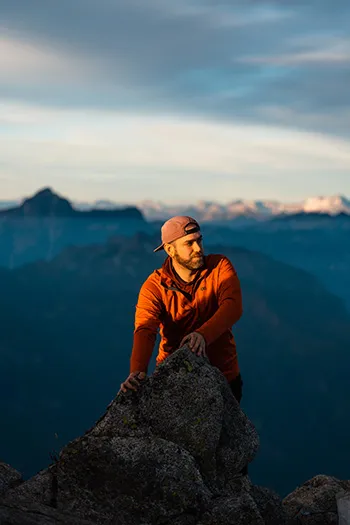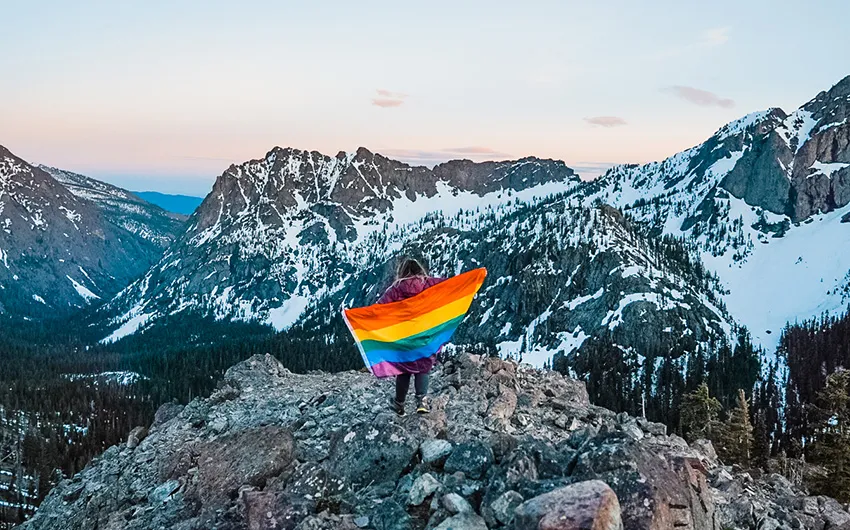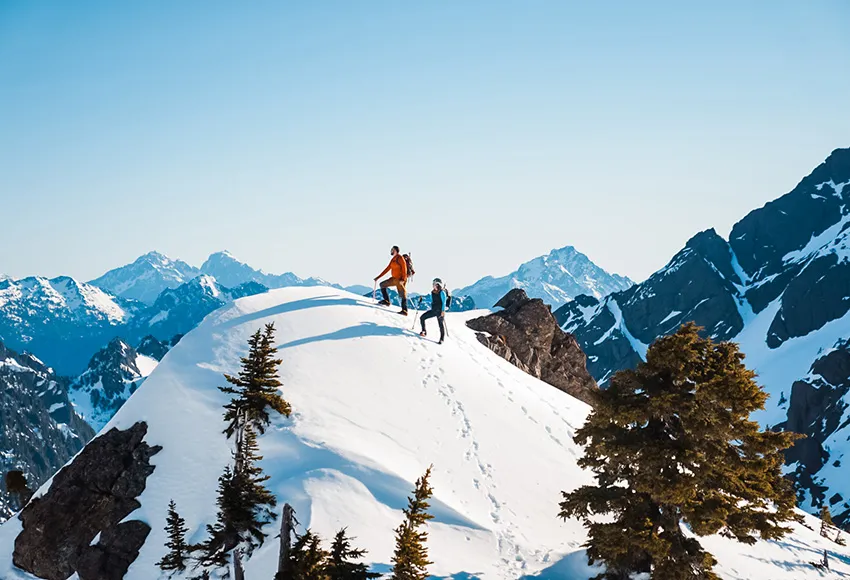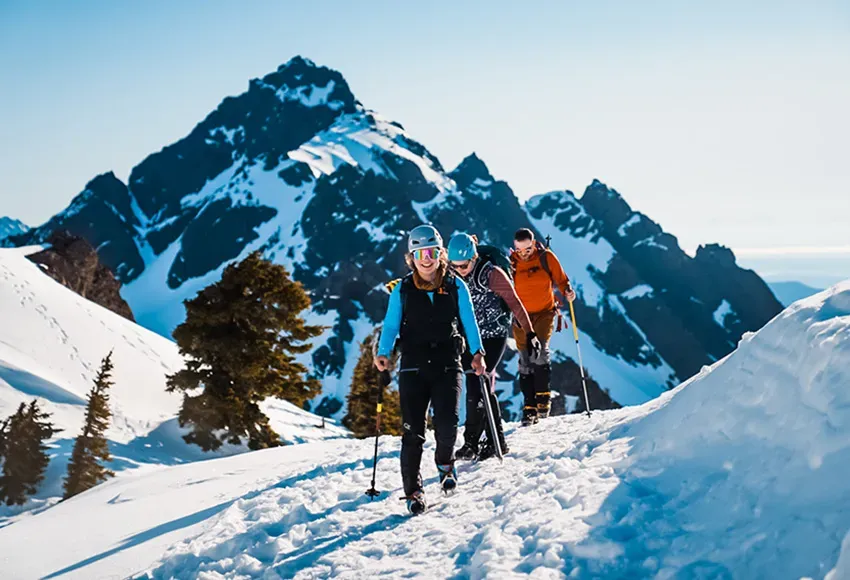Queer affinity groups abound in big cities, whether for makers, classical musicians, or any other hobby, yet mountaineering has been a glaring exception in Seattle, a city surrounded by beautiful hikes and towering mountains.
Last year, Queer Mountaineers set out to change that, and peak by peak, trail by trail, the group has been leading forays into a world normally dominated by heterosexual, cisgender men. And it's raising money for charity while it's at it.

"It started as a small, little hiking group that I created back in, I wanna say 2019," said co-founder Jude Glenn, who goes by any pronouns. It was a casual thing, he said, where people could "throw in" plans and invite friends.
In a video conference, Glenn and co-founder Sarina Pizzala spoke about Queer Mountaineers' beginnings, goals, and activities. Though they sat indoors, they were surrounded by the tumbling greenery of potted plants.
"And then 2020 just killed that group," Glenn went on. "We couldn't do any community things at that point."
It was a trek down Mt. Eleanor last summer that brought about the idea to pursue something grander – a less insular space, open to more people in the Queer community.
They "decided it was gonna be a lot more organized this time," Glenn said.
Pizzala explained further: "For context, in Seattle, and even across the country, there's not really a group like this that exists, that focuses on getting Queer community outside, especially into technical places in the mountains."
Climbers and hikers might disagree with the above, pointing out that there are Queer groups for climbing and hiking. But "mountaineering" involves a much broader range of skills than either of those activities on their own. The common term for terrain that would demand a good portion of those skills is "technical."
"That could be scrambling, back-country skiing... requiring ropes, crampons, [an] ice axe," Pizzala explained. "So, often there's extra gear needed, extra knowledge needed."
"As far as the technical aspect, it felt like an empty space there that we were happy to help try and [fill]," she said.

Bringing the mountain to the Queers
Glenn got into mountaineering in 2019, "and being nonbinary, I felt like there just wasn't this space for me in the mountaineering world," he said.
"After 2020, I decided I wanted to push myself... I wanted to live, and just go all in on mountaineering."
Glenn used the term "peak-bagger" for the mentality of the cisgender, heterosexual men he mountaineered with with at first; the men's singular focus was to conquer one mountain and move on to the next, at the expense of actively sharing a "transformative experience," as Pizzala called it.
"It wasn't that community of, 'Let's nurture you and help drive you,'" Glenn said.
Instead, it seemed commonplace to carry patriarchy up the slopes as well.
"Historically, mountain sports are very much overrun by white, cis, older men and the privilege that comes with it," Pizzala said. "So there's been a gap in accessibility for LGBTQIA+ folks to access these kinds of activities. So this group hopes to increase access."
"Which makes Washington a pretty ideal place to have this kind of group," she added, "because we have access to so much amazing technical terrain, and when you're doing that, you want to feel safe and supported with your community."
Queer Mountaineers' two biggest priorities, then, are community and access.
To build community, the group meets in some of the usual places, like Optimism Brewing Company on Capitol Hill and Reuben's Brews in Ballard, but a good portion of its events take place at climbing and bouldering gyms. According to Glenn, a few members have expressed gratitude for finally having a Queer space that isn't centered around alcohol.
It's unusual for a Queer space to be nonurban, too. The group gets together for day hikes, "ski and shred" meets, and other outdoor events, which ties into the subject of access, since the more experienced members run free clinics on mountaineering skills like snow camping, climbing, and the like.
"We're comfortable teaching those skills," Pizzala said. "[For] anything beyond that, we'd want a guide involved."
More recently, Queer Mountaineers has been applying for grants. Money, Glenn emphasized, is one of the biggest barriers to entry for mountaineering, because starting out on your own requires training and equipment – both prohibitively expensive.
A six-week mountaineering course cost Glenn $1,000–2,000. With equipment and supplies for the first two peaks, the total went up to $10,000. The right grants could help pay for equipment and training that could get Queer people who'd otherwise be stuck at sea level to a mountaintop and back.

Hiking and healing
Glenn and Pizzala aren't just sharing skills and gear, though. They're sharing access to hard-to-reach parts of the world that have great spiritual weight, and expand the boundaries of Queer safe spaces to the horizon. There, away from the stress of modern life, one might have room to think and heal.
Glenn described mountaineering as a way to build confidence in a world that chips at it constantly.
"I wanted to prove to myself what I was capable of, because society has really torn down the Queer community over time, and kept us in our own little bubbles," he said. "So getting out there and showing yourself what you can do, showing yourself what you're capable of – especially in mountaineering, because you're out there for hours on a mountain, and telling yourself, 'one more step, one more step' – becomes meditative."
Pizzala hit similar notes, but her stakes in the hobby held a different weight and urgency.
"I feel like mountaineering was an escape for me in a previous abusive relationship, and as I built the skills within that world, I gained a lot of confidence and motivation to take that into my daily life," she said. "I was able to leave that marriage."
"I think it's completely life-changing, and something that other people should be able to experience," she added. "Now, seeing that light in people's eyes is what really drives us to do what we're doing with this group."
In the wake of the lethal shooting at Club Q, Queer Mountaineers partnered with the Seattle Bouldering Project to raise money for the National Compassion Fund. Organizations like Outdoor Research, Eddie Bauer, and Nör Hex donated gear for giveaways. Between that, money donations, and merchandise sales, the group managed to raise $2,600 for the survivors and victims in one night.
"We are shook," the group wrote on Instagram in response to the event's turnout. "Everyone really came through to help make it happen."
As for the group's future, its members are "nothing if not dreamers," Glenn said. A fundraiser is planned for March, and they've been in contact with Edgeworks Tacoma, gyms in Portland and Snoqualmie, and a group with a similar goal, OUT in the Wild, who are all "so stoked to work with us."


